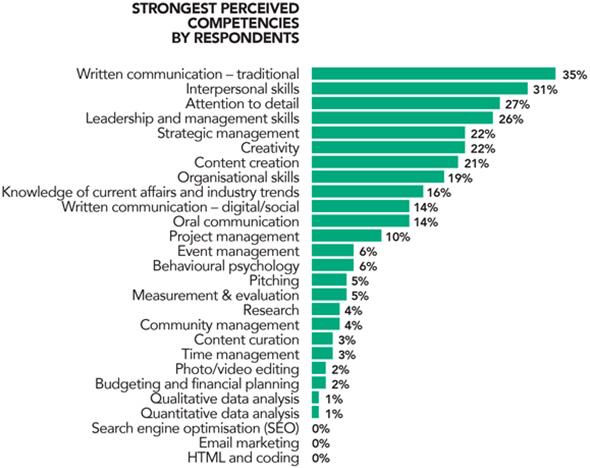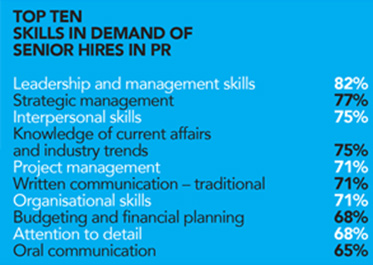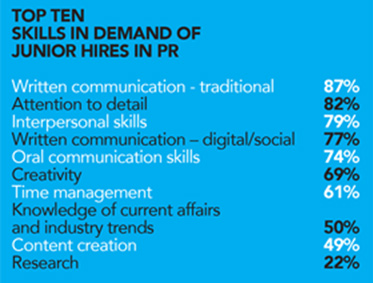Why are PR professionals in India falling behind the skilling curve?
PR Insight
Paarul Chand
 If you ask any senior PR professional about the biggest challenge facing the PR business in India, they will say talent and the lack of new PR skills which include SEO, social media and digital storytelling as well as video.
If you ask any senior PR professional about the biggest challenge facing the PR business in India, they will say talent and the lack of new PR skills which include SEO, social media and digital storytelling as well as video.
While it’s a subject that is vital to the survival of the PR business, solutions are not easily available.
What is stopping PR pros from upskilling and adjusting to the new order? We ask a range of professionals what abilities are vital in PR and why they don’t have some of these key proficiencies.
Kirtan Chauhan, senior consulting associate with Simulations Public Affairs Management Services, quite naturally says that all aspects of digital media matter. Another skill that is needed is that, “PR pros should exchange the information correctly, before time, to the right journalist, with all given inputs. Because nowadays sending a press release more than one time is useless. So smart ways to exchange the information is much needed.”
Last of all, Chauhan says data analytics very critical for PR.
While, Chauhan says, he has not formally studied some of these skills, he feels he is gaining understanding of them through work experience.
Chauhan admits that when it comes to picking up new skills, many PR pros are not keen, “Yes, it is true that mostly new generation of PR pros does not want to work with multiple skills. If one is assigned primarily for media relations he/she will not try to improve other PR skills like social media, SEO, event management which ultimately helps and improves their current work and makes a big impact on future work.”
Kanupriya Jain, account manager, Media Mantra, agrees in part. She says, "Yes, to an extent these days professional don't go "extra mile" to learn and grow. Some of them are confined to establishing media relations only, though it's an important aspect but PR is lot more. We should be well versed with diversified industries, proactive in our approach and ready with "out of the box " ideas.
Rishi Bammi, PR account consultant, Value 360 Communications, confirms that, “Yes, I do agree that most of the PR Professionals doesn’t want to leave their comfort zone. But in a way it is also responsibility of the organizations to help the professionals in the enhancement of their skills.”
Senior agency heads told PRmoment India that even when training sessions are arranged; attendance can be low.
Bammi doesn’t agree with this assessment saying she would love to attend training. She says, “I do possess some of the skills including social media management (including tweeting the relevant coverage & the articles) online video, use of relevant hashtags and eloquent communications skills but certainly needs to learn SEO, analytics and other PR measurement skills.”
The latest ‘State of the Profession’ report from CIPR identified the following as key skills needed:

Some of the skills listed below are needed to move up the ladder:

Mangal Karnad, who recently set up Fables Square moved from sales to PR. She feels that it’s important to understand, “the unstated needs of the client and to identify the right media to reach the target audience of the client. “
Karnad also favors soft skills such as the ability to listen. She says, “For example, in an interview, if the client is responding and is not being understood, then step in, in a non-threatening fashion and clarify to the reporter.”
Certainly, Indian PR professionals are aware of the skills needed. Nikunj Kewalramani, marketing communications specialist says he feels more than technical skills, strategic skills like problem solving are very important. Says Kewalramani, “PR is a critical business function for brands. We have seen many start-ups like Oneplus, Snapchat, Xiaomi who have carefully used PR to build their brand. Professionals in the industry must think like a business manager who are responsible for revenue generation of the brand.”
Kewalramani, doesn’t agree that the current generation of PR executives is not interested in learning saying that, “ I would disagree to this statement; I think PR pros are very interested in learning new skill sets beyond media relations. They are always on a lookout to learn something new. If we invest good time and resources, I am sure our industry will see some great talent in the years to come.”
No time, no resources
Here is the crux of the issue. Even if PR executives overcome the challenges of upskilling; resources and time are at a premium for training. This means that future PR leaders often do not gather the abilities and talents needed to grow the PR business.

There is no doubt that the young crop is more than aware of some of these requirements. Ankita Vaid, who describes herself as a public relations officer agrees that certain soft skills matter a lot in PR. Says Vaid, “It’s the job of a PR person to figure out what is the ongoing trend or news and how the client can be a part of it. At times a PR person needs to give media a story and if he is not aware or has that presence of mind to draw out a story from the current situation, then it becomes really problematic.”
What is also problematic is that skills training is not keeping pace with what is needed, training is not incentivized enough or institutionally planned across the PR industry to attract large scale interest. While this may be a symptom of the overall skill gap in the Indian economy, the PR business in India can ill afford to have this haunt balance sheets in the future.
If you enjoyed this article, you can subscribe for free to our weekly event and subscriber alerts.
Featured

PR professionals share their views on journalists publicly calling them out on story pitches

Auto blogger renders unconditional apology to Value 360 for defamatory posts

Hottest Indian startups of 2020, Paytm, Dreams 11 lead the charge: Wizikey Report




